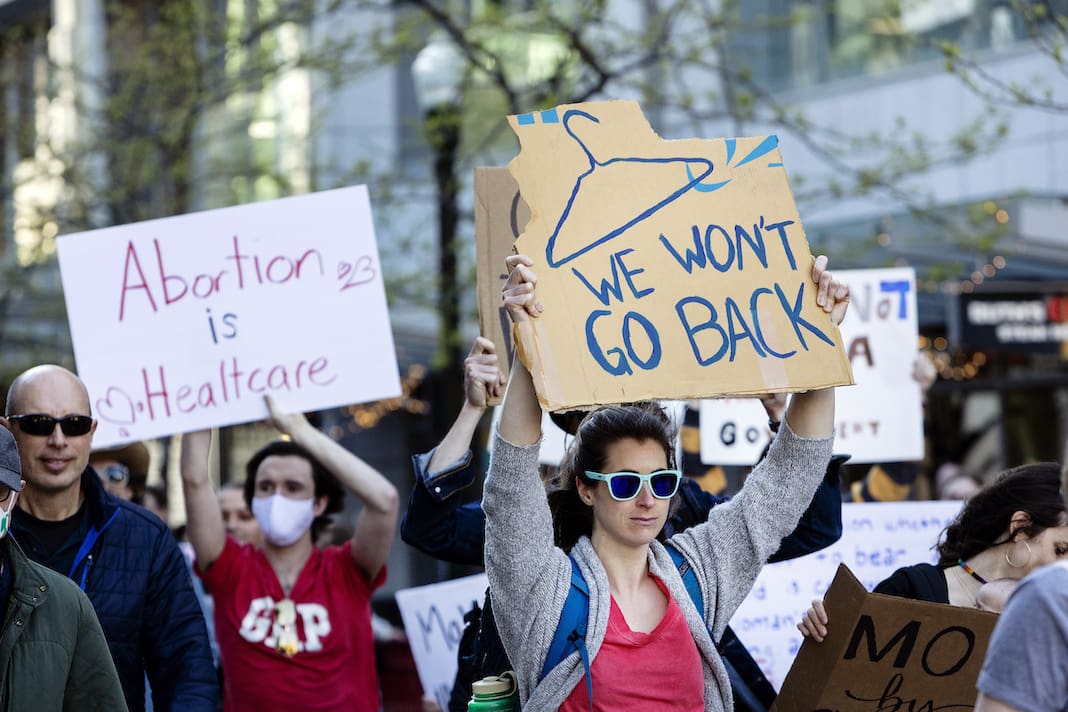Abortion rights roundup: September 8, 2023
The latest news impacting reproductive rights around the country.

This series is a weekly roundup of abortion news, covering various statewide laws and bans, those who stand up to them, and the ongoing push by anti-abortion conservatives to restrict abortion care and erase bodily autonomy.
Wisconsin Democrats defend liberal justice from the GOP
On Aug. 6, the Democratic Party of Wisconsin launched Defend Justice, a $4 million multi-pronged campaign designed to inform the public about the onslaught of threats by Wisconsin Republican legislators to impeach Supreme Court Justice Janet Protasiewicz.
Wisconsin Democrats said the campaign aims to “mobilize Wisconsinites to call on their legislators to reject any effort by Robin Vos and Republicans to overturn the will of Wisconsin voters through an unconstitutional and unprecedented impeachment power grab.”
Protasiewicz was elected to her seat in April, defeating conservative candidate Daniel Kelly. Her win flipped the Court 4-3 to a liberal majority.
The state Legislature has threatened to impeach the justice over demands that she recuse herself in cases involving redistricting and abortion law. Before Protasiewicz’s win, she made her opinions known in ads declaring support for abortion care, calling the state’s Republican-drawn maps “rigged.”
Two lawsuits were filed in the first week after Protasiewicz took office in August, challenging Republican-drawn maps in the state.
On Aug. 6, the Associated Press reported that the Wisconsin judiciary disciplinary panel rejected complaints about Protasiewicz’s ability to be unbiased.
Doctors who specialize in high-risk pregnancies are leaving abortion-restrictive states like Idaho in droves.
The New York Times reports that doctors specializing in high-risk pregnancies are fleeing abortion-restrictive states, such as Idaho, at alarming rates.
Not only are patients in these states losing the expertise of these physicians, but the gap is making way for maternity deserts, particularly in rural areas, the Times reports.
“This isn’t an issue about abortion. … This is an issue about access to comprehensive obstetric and gynecologic care,” Dr. Stella Dantas, president of the American College of Obstetricians and Gynecologists, told the Times. “When you restrict access to care that is based in science, that everybody should have access to — that has a ripple effect.”
Yale Medicine defines a high-risk pregnancy as “one in which a woman and her fetus face a higher-than-normal chance of experiencing problems.” Risks include the age of the pregnant person or patients with preexisting medical conditions such as cancer, diabetes, or lupus.
Abortion care in Idaho is banned at all stages of pregnancy. The only exceptions are in cases when the pregnant person’s life is in danger or in cases of rape or incest, and even then, abortion care is only legal within the first trimester of pregnancy — about 12 weeks.
The Times reports that not only are doctors leaving states where abortion care is largely banned, but recruiting new physicians is proving to be extremely difficult.
Dr. Nicole Teal, a physician who finished her training in North Carolina in June 2023, told ABC News that she was choosing to move away because of the state’s abortion laws.
“Being able to provide abortion care after 20 weeks is really fundamental to my practice and comes up for me on a weekly basis,” Teal said.
A new abortion ban in Texas would criminalize patients driving through towns for abortion care.
Several small towns in Texas are creating ordinances that prohibit people from transporting a pregnant person through towns in order to obtain abortion care out-of-state.
According to the Washington Post, the ordinances make it illegal for patients seeking abortion care to travel to a bordering state, such as New Mexico, by cutting off interstates and roads.
Two counties and two cities in Texas have already passed the restrictive measures.
“This really is building a wall to stop abortion trafficking,” Mark Lee Dickson, an extremist anti-abortion activist and the architect of the recent measures in Texas, told The Washington Post.
The Texas Tribune reports the so-called “abortion trafficking” laws allow someone to sue over a violation of the ordinance.
“They’re also trying to create a precedent, kind of bit by bit, establishing that a fetus is a rights-holding person, or an unborn child is a rights-holding person in the law,” Mary Ziegler, a law professor at the University of California at Davis, told ABC Channel 13. “It’s a bid to eventually get that claim before the U.S. Supreme Court.”
Section one of the 14th Amendment to the U.S. Constitution outlines a fundamental right to travel.
“The purpose of these laws is not to meaningfully enforce them. … It’s the fear that’s the point. It’s the confusion that’s the point,” Neesha Davé, executive director of an abortion fund in Texas called Lilith Fund, told the Tribune.
Published with permission of The American Independent Foundation.
Recommended

Fate of ‘game changer’ women’s health care bill in hands of Missouri Senate
A bill that would improve health care access for Missouri women almost died in the House after some lawmakers conflated birth control legislation with abortion medication
By Anna Spoerre, Missouri Independent - May 08, 2024
Trump leaves door open to banning medication abortion nationwide
Donald Trump is planning to release more details in the weeks ahead about how his administration would regulate access to medication abortion, according to comments he made during a lengthy interview with Time magazine published Tuesday.
By Jennifer Shutt, States Newsroom - April 30, 2024
Ohio doctors fear effects of emergency abortion care case set to go before U.S. Supreme Court
A federal law that allows emergency departments to treat patients without regard to their ability to pay will be under U.S. Supreme Court scrutiny this week, and Ohio doctors are concerned about the case’s local impact on emergency abortion care.
By Susan Tebben, Ohio Capital Journal - April 23, 2024







































































